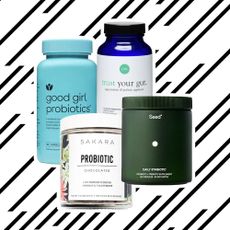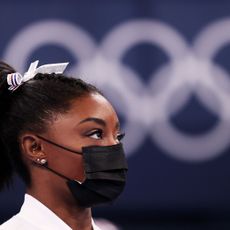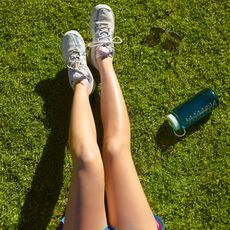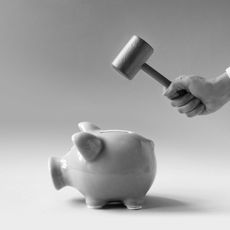What's the best time to exercise? If you answered, "Anytime I can drag my spandex-clad ass to the gym," it's not that you're wrong exactly, but your body does respond to exercise differently throughout the day. Given how hectic life can be, it makes sense to get the most out of every minute spent exercising. Here, experts help you find the best time to schedule your workout based on the benefits you're looking to achieve.
If you have a stressful meeting planned
…
Work out just before it. Thirty minutes of moderate-intensity exercise can lessen your body's physiological reaction to stress by boosting feel-good neurotransmitters such as dopamine. "It also encourages your brain to switch off its stress response," says J. Carson Smith, Ph.D., an assistant professor of kinesiology at the University of Maryland. "You'll feel the effects about 15 minutes after you finish your workout."
If you have trouble sleeping
…
Do the right exercise before bed. You may have heard that vigorous exercise before bed makes it harder to fall asleep, but according to a new report from the National Sleep Foundation, people who exercise at any time of day or night get better z's than couch potatoes. If you're a poor sleeper, a quick yoga session is best. Research shows 30 minutes can improve sleep quality and help you conk out faster. It's also safer than sleeping pills, which can sometimes leave you dangerously drowsy while driving the next morning, says Dr. Barbara Phillips, medical director of the sleep lab at the University of Kentucky.
If you want to prevent injury
…
Aim for the early evening. Prone to pulled muscles, soreness, sprained ankles (you get the idea)? Then wait until after work to exercise. Early in the day when your natural temperature is lower, "your body isn't necessarily ready to jump out of bed and perform, so you may be more vulnerable to strain and injury," says Michael Deschenes, Ph.D., professor and chair of the department of kinesiology and health sciences at the College of William & Mary in Williamsburg, Virginia. To avoid injury, exercise between 4 p.m. and 8 p.m., when core temp peaks.
Stay In The Know
Marie Claire email subscribers get intel on fashion and beauty trends, hot-off-the-press celebrity news, and more. Sign up here.
If you want to drop pounds
…
Work out before breakfast. Maximize your body's flab-burning potential by hitting the gym first thing in the morning. People who ran on a treadmill before breakfast burned about 20 percent more fat compared with a group who ate breakfast first, according to a recent study published in the British Journal of Nutrition. "Your body taps into fat stores for fuel instead of carbohydrates from breakfast," explains study coauthor Javier Gonzalez, who studies exercise and metabolism.
If you want to tone up
…
Exercise after dinner. Because of the uptick in core body temps later in the day, exercise performance improves. Namely, muscle strength increases slightly, coordination is better, and your VO2 max (the amount of oxygen delivered to muscles) rises. Translation? "Your workout may feel a bit easier," says Deschenes. It's a small improvement, but one that may help you upgrade from 5-pound weights to 10-pound ones, resulting in more marked muscle tone.
If you want to avoid an allergy attack
…
Work out in the evening. Fall allergies are often caused by ragweed—and those pollen levels are at their highest between 4 a.m. and 10 a.m. That means the morning run you thought would be energizing might make you groggy and bring on allergy symptoms that continue throughout the day, says board-certified allergist and immunologist Dr. Sakina Bajowala, a fellow of the American Academy of Allergy, Asthma & Immunology. Two options: Move indoors or work out later, when pollen counts are lower.
-
 'Shōgun' Is a Masterpiece—Will There Be More Episodes?
'Shōgun' Is a Masterpiece—Will There Be More Episodes?With those ratings, never say never.
By Quinci LeGardye Published
-
 32 Child Stars Who Have Aged Like Fine Wine
32 Child Stars Who Have Aged Like Fine WineThey made the notoriously bumpy transition to adulthood look easy.
By Katherine J. Igoe Published
-
 Zendaya Thinks It’s “Very Odd” That People Are So Interested in Her Onscreen Kissing Scenes
Zendaya Thinks It’s “Very Odd” That People Are So Interested in Her Onscreen Kissing Scenes“If there was somebody else here, you probably wouldn’t ask that question.”
By Rachel Burchfield Published
-
 Senator Klobuchar: "Early Detection Saves Lives. It Saved Mine"
Senator Klobuchar: "Early Detection Saves Lives. It Saved Mine"Senator and breast cancer survivor Amy Klobuchar is encouraging women not to put off preventative care any longer.
By Senator Amy Klobuchar Published
-
 How Being a Plus-Size Nude Model Made Me Finally Love My Body
How Being a Plus-Size Nude Model Made Me Finally Love My BodyI'm plus size, but after I decided to pose nude for photos, I suddenly felt more body positive.
By Kelly Burch Published
-
 I'm an Egg Donor. Why Was It So Difficult for Me to Tell People That?
I'm an Egg Donor. Why Was It So Difficult for Me to Tell People That?Much like abortion, surrogacy, and IVF, becoming an egg donor was a reproductive choice that felt unfit for society’s standards of womanhood.
By Lauryn Chamberlain Published
-
 The 20 Best Probiotics to Keep Your Gut in Check
The 20 Best Probiotics to Keep Your Gut in CheckGut health = wealth.
By Julia Marzovilla Published
-
 Simone Biles Is Out of the Team Final at the Tokyo Olympics
Simone Biles Is Out of the Team Final at the Tokyo OlympicsShe withdrew from the event due to a medical issue, according to USA Gymnastics.
By Rachel Epstein Published
-
 The Truth About Thigh Gaps
The Truth About Thigh GapsWe're going to need you to stop right there.
By Kenny Thapoung Published
-
 3 Women On What It’s Like Living With An “Invisible” Condition
3 Women On What It’s Like Living With An “Invisible” ConditionDespite having no outward signs, they can be brutal on the body and the mind. Here’s how each woman deals with having illnesses others often don’t understand.
By Emily Shiffer Published
-
 The High Price of Living With Chronic Pain
The High Price of Living With Chronic PainThree women open up about how their conditions impact their bodies—and their wallets.
By Alice Oglethorpe Published